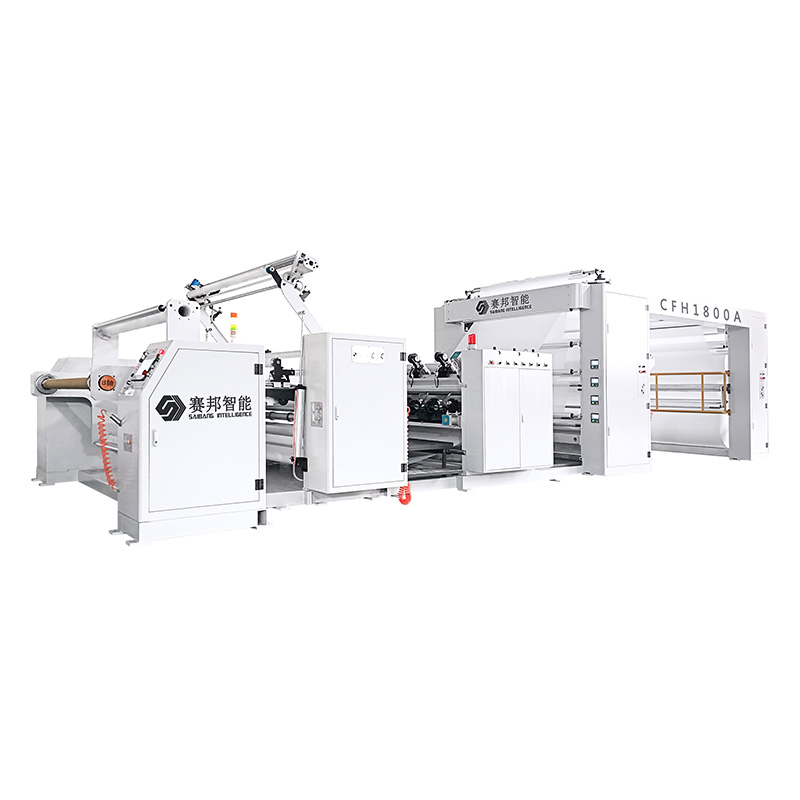What Is The Use Of An Ultrasonic Machine?
An ultrasonic machine is an advanced piece of industrial equipment that utilizes ultrasonic vibration energy to perform processes such as welding, cutting, sealing, or laminating without the need for adhesives or high heat. In modern manufacturing—especially in nonwoven fabric, hygiene products, and medical material industries—ultrasonic technology plays a vital role in creating clean, strong, and precise bonds between layers of material.
At Foshan Saibang Intelligent Equipment Co., Ltd., our ultrasonic Laminating Machines are designed to deliver efficient, high-speed, and eco-friendly bonding for multiple layers of nonwoven, laminated film, and hot-air materials. These machines are widely used for protective clothing, medical gowns, sanitary materials, and industrial filters, offering exceptional quality and reliability.
1. What Is an Ultrasonic Machine
An ultrasonic machine operates by converting electrical energy into high-frequency mechanical vibrations. These vibrations are transmitted through a horn (sonotrode) to the materials being joined, generating friction and localized heat at the contact point. This causes the materials to melt and bond together without damaging the surrounding area.
How Ultrasonic Lamination Works
Power Conversion – The generator converts standard electrical energy (50/60Hz) into high-frequency electrical energy (usually 20–40kHz).
Transducer Action – The transducer converts this energy into mechanical vibrations.
Amplification – A booster increases the amplitude of the vibrations.
Bonding Process – The horn presses layers of material together while vibrating at ultrasonic frequency, fusing them under controlled pressure.
| Component | Function | Description |
|---|---|---|
| Generator | Power Source | Converts electrical energy into high-frequency current |
| Transducer | Energy Converter | Changes electrical energy into mechanical vibration |
| Horn (Sonotrode) | Transmission Tool | Directly applies vibration and pressure to the material |
| Anvil Roller | Support Structure | Works with the horn to form continuous bonding patterns |
Unlike thermal bonding or chemical adhesives, ultrasonic machines achieve strong and clean bonding without glue, smoke, or residue, making them ideal for medical and hygiene applications.
2. Main Uses of Ultrasonic Machines
Ultrasonic machines have broad industrial applications, but the ultrasonic laminating machine specializes in bonding nonwoven and film materials efficiently and hygienically.
A) Medical and Hygiene Product Manufacturing
Ultrasonic lamination is widely used to produce:
Medical gowns, surgical masks, and isolation suits.
Sanitary napkins, baby diapers, and adult incontinence pads.
Protective materials for hospitals and laboratories.
The ultrasonic process ensures airtight and fluid-resistant seams without needle holes or adhesives, which is crucial for preventing contamination and maintaining softness.
B) Nonwoven Fabric Processing
Our machines are compatible with spunbond, melt-blown, and hot-air nonwoven fabrics. The process provides:
Soft-touch bonding for hygiene and medical fabrics.
Smooth and consistent sealing across multilayer structures.
Support for 3D embossing and aesthetic surface patterns.
| Model | Material Adaptation | Width | Design Speed | Applications |
|---|---|---|---|---|
| CFH25A | Nonwoven fabric | 1800–2800 mm | 80 m/min | Hygiene, medical gown lamination |
| CFH1800 | Nonwoven fabric | 1000–1800 mm | 80 m/min | Surgical, protective garments |
| SPH65A | Hot air / Spunbonded nonwoven | 650 mm | 80 m/min | Filter fabric, mask layers |
C) Industrial and Filter Applications
Ultrasonic machines are also used for industrial filter media, acoustic insulation, and automotive interior materials.
Strong, flexible bonding without adhesives.
Precise sealing for multilayer filter components.
Dust-free production suitable for clean environments.
D) Textile and Decorative Film Lamination
For decorative or industrial textiles, ultrasonic lamination enables:
Custom surface designs such as embossed logos or 3D patterns.
Seamless bonding that maintains fabric flexibility.
High-efficiency production for curtain, upholstery, or packaging applications.
3. Advantages of Using an Ultrasonic Laminating Machine
The popularity of ultrasonic machines in the nonwoven and hygiene industries stems from their technological efficiency, environmental performance, and precision.
A) Eco-Friendly and Energy-Efficient
No need for adhesives, solvents, or additional heating elements.
Reduces material waste and lowers energy consumption.
Operates cleanly with zero emissions, suitable for sterile production lines.
B) Superior Bonding Strength and Quality
Ultrasonic lamination produces uniform welds that are:
Stronger than glued joints.
Resistant to washing, tearing, and high temperatures.
Consistent even at high speeds, ensuring stable output.
C) Flexibility and Customization
Saibang’s ultrasonic laminating machines support custom width and pattern design:
Adaptable for flat or 3D embossed lamination.
Suitable for multilayer nonwoven and thin film structures.
User-friendly PLC controls allow quick changeovers for different production needs.
| Advantage | Description | Benefit |
|---|---|---|
| Non-contact bonding | Reduces mechanical stress on materials | Maintains softness and comfort |
| Fast processing | Instant weld formation | High-speed continuous production |
| Low maintenance | Fewer moving parts | Reduced downtime and cost |
| Customizable patterns | Supports decorative and functional embossing | Enhances visual and tactile quality |
D) Enhanced Safety and Hygiene
Since the process does not use needles, heat, or glue:
There’s no risk of contamination, making it perfect for medical and hygiene products.
Operators enjoy safer working conditions with automated controls and low noise levels.
Summary
An ultrasonic machine is a cutting-edge solution for bonding, sealing, or laminating materials using high-frequency vibration energy. It eliminates the need for adhesives, heat, or chemicals, resulting in clean, efficient, and environmentally friendly production.
In particular, the ultrasonic laminating machines developed by Foshan Saibang Intelligent Equipment Co., Ltd. offer:
High-speed precision bonding for multilayer nonwoven fabrics.
Durable and hygienic seams for medical and sanitary products.
Custom design capabilities, including 3D embossing and multilayer lamination.
Energy-efficient, low-maintenance performance for continuous industrial operation.
From 650 mm compact models for narrow materials to 2500 mm wide systems for full-scale nonwoven production, Saibang’s ultrasonic laminating machines represent the ideal choice for manufacturers seeking productivity, sustainability, and superior quality.



